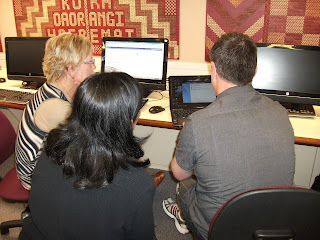_________________________________________________________
Kawaha Point Team reflects
_________________________________________________________
Ngongotaha Junior Teachers sharing their thinking
__________________________________________________________
______________________________________________________
Another partnership from Otonga share their thoughts
_______________________________________________________________
An Otonga teacher teamed up with her student teacher for rich conversation
__________________________________________________
The St Mary's Junior Team debate the barriers and how to overcome them......
Teachers from two different schools, team up to share their thinking
How does “doing school” discourage questioning?
Children are expected to sit down and listen, raise a hand if they have a question and take turns before answering. The question is often lost/forgotten, or the discussion has moved on. Often the more confident children do all the questioning.
The questions that get asked are often very simple, repetitive, not higher order thinking. The best questions can be the ‘blurt it out’ ones or supposedly off topic. We don’t always spend a lot of time on questioning – we are telling them things, the same kids ask them all, a child can take a long time to get it out, the others get wriggly and distracted etc.
SOLO can give the chance to hear all children’s questions and viewpoints – they all have a voice. The lower order thinking maps are generally whole class activities, where all children take turns to offer ideas. Deeper thinking questioning can just occur as an offset of this. Sequence maps, classification, part whole maps can be undertaken in groups again with everyone getting a chance to question decisions. In the junior school a lot of this is oral and not necessarily recorded.








No comments:
Post a Comment